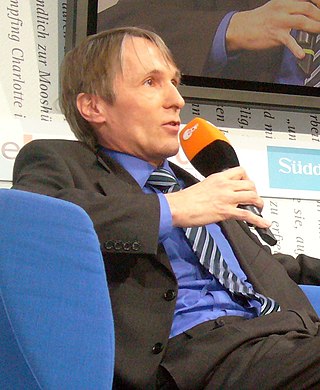
Hubertus Knabe is a German historian and was the scientific director of the Berlin-Hohenschönhausen Memorial, a museum and memorial in a notorious former Stasi torture prison in Berlin. Knabe is noted for several works on oppression in the former communist states of Eastern Europe, particularly in East Germany. He early became involved with Green politics, and was active in the Green Party in Germany.
Eckhard Jesse is a German political scientist. He held the chair for "political systems and political institutions" at the Technical University of Chemnitz from 1993 to 2014. Jesse is one of the best known German political scholars in the field of extremism and terrorism studies. He has also specialized in the study of German political parties and the German political system.

Thomas Lutz is the head of the Memorial Museums Department of the Topography of Terror Foundation in Berlin, and active in Holocaust education and research at the national (German) and international level.

Thomas Welz grew up in the suburbs of Berlin. As head of the information department, he was editor and author of several illegal samizdat publications with Rainer Eppelmann of the peace circle of the East Berlin Samariterkirche in Berlin-Friedrichshain. Many of them became the mouthpiece of the East German civil rights movement, including publications like "Shalom", "Wegzehrung" and "Wendezeit", one of the first publications, in where term "Wende" was used. During his military service in the NVA, Thomas Welz was detained for five months from October 1978 in the infamous military prison in Schwedt.

The Stiftung Ettersberg is legally established foundation, located in Weimar, Germany. Its mission is the comparative study of European dictatorships and their transition to democracy. The foundation administers the Memorial and Education Centre Andreasstrasse, a museum housed in the former Stasi prison in Erfurt.

Lutz Rathenow is a dissident German writer and poet who was haunted by the Secret Police until the German reunification. From then on, his fortunes changed, and he received several literary honors and awards.
Werner E. Ablaß is a German politician who was a Christian oppositionist in East Germany (GDR). Together with minister Rainer Eppelmann, Secretary of State in the Ministerium für Abrüstung und Verteidigung (MfAuV), Ablaß played a major role in the closure of the National People's Army (NVA) during the German reunification.
Ulrich Woronowicz was an East German Protestant theologian and writer.

Zersetzung was a psychological warfare technique used by the Ministry for State Security (Stasi) to repress political opponents in East Germany during the 1970s and 1980s. Zersetzung served to combat alleged and actual dissidents through covert means, using secret methods of abusive control and psychological manipulation to prevent anti-government activities. People were commonly targeted on a pre-emptive and preventative basis, to limit or stop politically incorrect activities that they may have gone on to perform, and not on the basis of crimes they had actually committed. Zersetzung methods were designed to break down, undermine, and paralyze people behind "a facade of social normality" in a form of "silent repression".

Helmut Müller-Enbergs is a German political scientist who has written extensively on the Stasi and related aspects of the German Democratic Republic's history.
An unofficial collaborator or IM, or euphemistically informal collaborator, was an informant in the German Democratic Republic who delivered private information to the Ministry for State Security. At the end of the East German government, there was a network of around 189,000 informants, working at every level of society.
Ilko-Sascha Kowalczuk is a German historian and author. His work is focused on the German Democratic Republic and its Ministry for State Security.

Thomas Ammer is a German historian who as a young man studied to become a physician. He was arrested and imprisoned in 1958 for anti-government political activism in East Germany and he never qualified as a medical doctor. His 15-year prison sentence was cut short in August 1964 when his release was purchased by the West German government, and at the age of 27 he relocated to the German Federal Republic.
Bernd Eisenfeld, also known by the pseudonym Fred Werner, was an opponent of the East German dictatorship who became a writer and an historian.
Ehrhart Neubert is a retired German Evangelical minister and theologian.
Katja Havemann is a German civil rights activist and author.
Martin Böttger was a prominent civil rights activist in East Germany. He was a member of the Landtag of the Free State of Saxony from 1990 to 1994 and led the faction of Alliance '90/The Greens.
Harry Weibel is a German historian. His main topics are neo-Nazism, right-wing extremism and antisemitism in the GDR and racism in Germany from 1945 to the present.

Gustav Havemann was a German violinist and from 1933 to 1935 head of the "Reichsmusikerschaft" in the Reichsmusikkammer.

Hildigund Neubert is the daughter of an East German Pastor-Theologian who became a professional musician. As the pressures for change in the one-party dictatorship intensified, thanks both to the bankruptcy of the state and to the winds of Glasnost blowing across from, of all places, Moscow, she found herself drawn by circumstances into politics. At the time of East Germany's "peaceful revolution" she was in East Berlin, a permanent presence at the control centre of Demokratischer Aufbruch . A feature of those months was the dispersed character of the uprisings that destroyed the dictatorship: it is misleading to think in terms of any sort of central "guiding hand" controlling developments. Nevertheless, DA was one of a number of movements and organisations that became key to focusing the energies of hundreds of thousands of pro-democracy campaigners and demonstrators, in ways that led, in March 1990, to the only free and fair parliamentary election in the history of the "German Democratic Republic" and thereafter, more indirectly, to reunification in October 1990.










